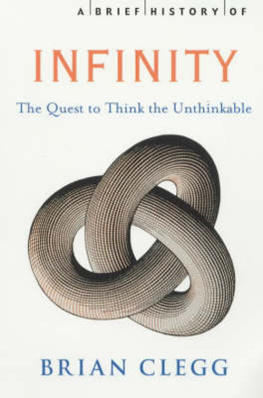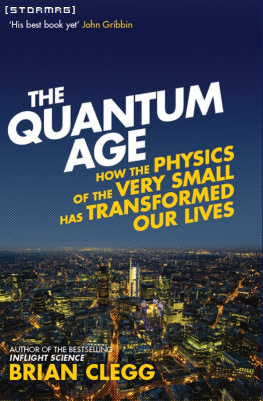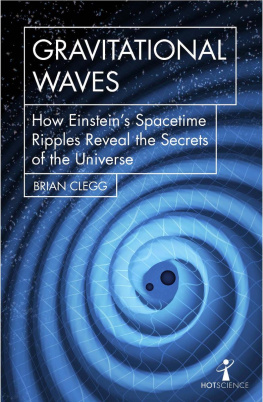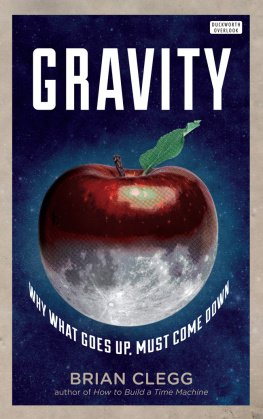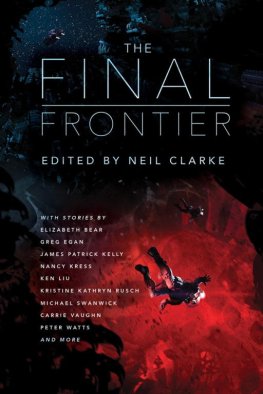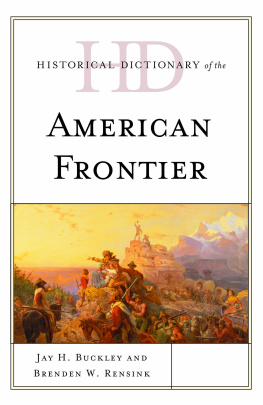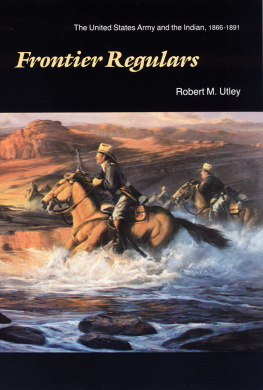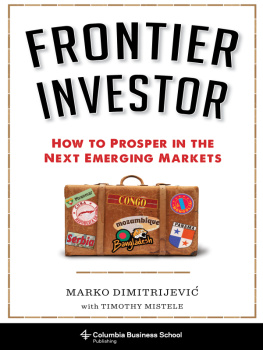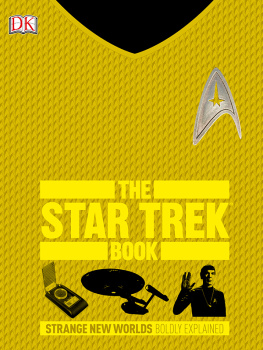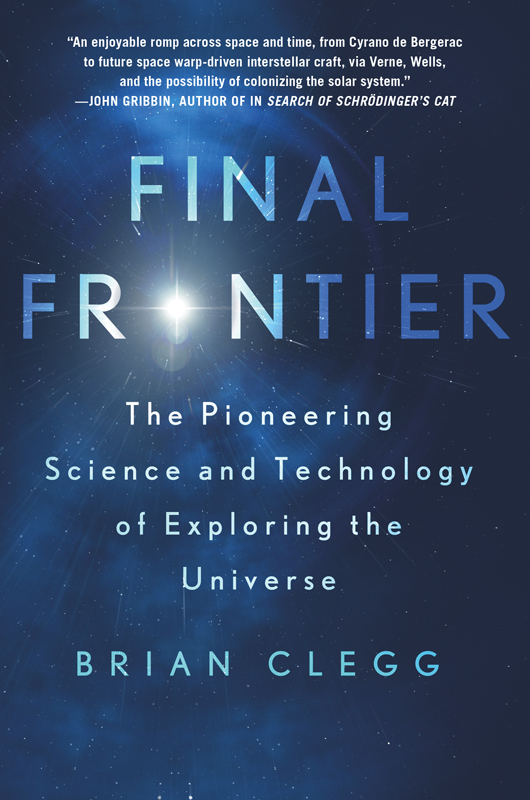Contents
Guide

The author and publisher have provided this e-book to you for your personal use only. You may not make this e-book publicly available in any way. Copyright infringement is against the law. If you believe the copy of this e-book you are reading infringes on the authors copyright, please notify the publisher at: us.macmillanusa.com/piracy.
FOR GILLIAN, CHELSEA, AND REBECCA
CONTENTS
NEW PIONEERS
The Earth is the cradle of humanity, but mankind cannot stay in the cradle forever.
Russian rocket scientist Konstantin Tsiolkovsky in a letter to an unidentified recipient (1911)
As most of us get on with our day-to-day lives, the concept of being a pioneer seems entirely alien. The closest we get to pioneering may be the choice of a different recipe for dinner, trying out that edgy new show, or being the first person from our town to visit an obscure foreign country. Yet the urge to boldly go where no one has gone before is a fundamental part of the human spirithowever much it has become a clich, and however watered down it may be in reality. There will always be those who are prepared to risk everything to open a new frontier, whether they will be regarded as heroes or candidates for a mental health assessment.
In history, many of those people who have ventured out across the world were looking for riches or territory to claim. Others simply wanted to be the first to a new locationor to expand the sum of human knowledge. To boldly know what no one has known before. Yet they have all shared an inability to stick with the status quo. They all had a very human urge to push the boundaries. And what greater frontier to open up than the very limits of the Earth, taking us into space?
GO WEST, YOUNG MAN!
Of all the people on the Earth, it is arguable that none has had as much of that frontier spirit, that urge to Go West, young man! and be a true pioneer, than the settlers of North America. This was encouraged by a unique opportunity. The first Europeans to reach America faced a vast and largely unexplored land that lacked the out-and-out hostility of the Australian outback, but instead always offered the promise of a new, potentially wealth-creating vista ahead. In part this spirit also seemed to reflect the kind of individuals who were prepared to take on the dangerous leap into the unknown that was involved in crossing the Atlantic and entering a new world. You didnt make such a huge break with everything you knew and understood if you were an unadventurous stay-at-home person.
For some, the frontier was the only hope of an independent future where they would have more freedom to practice their particular beliefs. For others it was, rightly or wrongly, a huge opportunity and an adventure. (I am well aware that these new unexplored lands were often already, if sparsely, occupied. But for the purposes of identifying the pioneering drive, this was not then an issue.) Although I am sure there is no such thing as a frontiersman gene, there seems to be some kind of inbuilt tendency to want to be a pioneer that was part of the forging of the American spirit. But what has happened to that tendency in a modern, interconnected world?
It would be sheer ignorance to say that there is no opportunity for exploration left anywhere on our planet today. There are territories where human beings have only scratched the surface. There are vast sections of the oceans in particular that have still to be explored, and still some regions of the Earth that are relatively lightly known. Whats more, there is always the second level of exploration where we go from simple discovery to a more detailed understanding. As Nobel Prizewinning physicist Steven Weinberg has pointed out, the loss of terra incognita from medieval maps does not mean that there is nothing more to discover: In the middle ages Europeans drew maps of the world in which there were all kind of exciting things like dragons in unknown territories. Nobody knew what was at the Antipodes. Yet the world without here be dragons, Weinberg argues, is not a boring place. He believes that it is better to know those fundamentals, and still to have lots of interesting detail to explore. If we had the fundamental laws of nature tomorrow, we still wouldnt understand consciousness. We wouldnt even understand turbulence Thats an outstanding problem that has been with us for almost two centuries and were not very close to a solution.
Weinberg is drawing a parallel between exploring the world and knowing more about physics, but his point that there is plenty left to discover after the basic pioneering has finished continues to apply to our actual world, bereft though it may be of dragons. Even so, having a true frontier to open up, one that is genuinely new and more alien than anything we have ever explored before, will always be an attraction. The sea may be huge, but it has not got the possibility of setting up permanent colonies that goes hand in hand with the frontier. And as the Earths unknown territories have one by one been crossed off the checklist, it is natural enough to turn our eyes upward, to look out to space, where there is enough room for pioneering to last the whole lifetime of a species and more.
MORE THAN SCIENCE
At the moment we tend to think of space exploration as a purely scientific endeavorand it certainly can be that. But it is a mistake, not surprisingly one that is often made by scientists, to assume that scientific discovery is all that matters. The frontiers of space are just as susceptible to those other reasons for pioneering as opening up land-based frontiers ever were. As we will discover, manned missions into space rarely make sense from a simple cost/benefit analysis of their scientific worth. They have always been, and always will be, more about the other aspects of pioneering than anything else. Science is a secondary aspect of reaching out beyond our atmosphere.
This is certainly true of our experience to date. The first, tentative steps into space were the result of political posturing. The USSR got the first satellite into orbit and put the first human being into space. In response, the United States had to find an opportunity to produce the true pioneers, making the first Moon landing a hugely attractive proposition. Yes, there was some scientific work done in the process. We learned a lot from the Apollo landings and their precursor missions. But the whole context of the race to the Moon, and the way that lunar flights ceased after Apollo 17 in 1972only the sixth manned landing on our natural satellite, and remaining our last visit with a crew to this daymade it clear that it was all about getting there first, rather than any drive for scientific discovery.
Since then, the human race has hardly done a lot to push back the frontiers of space as far as human exploration goes. Robotic substitutes like the Mars rovers and the Voyager missions reaching the far extremities of the solar system as this book is written, have certainly opened up aspects of our solar neighborhood for us as never before. And telescopes, particularly space telescopes like the Hubble and Planck satellites, have done wonders for us in terms of the kind of remote exploration made possible by the steady progress of light across the universe. But we havent been out there, pioneering as human beings.
EXPENSIVE EXPANSION
The clear difference between spreading out across space and the opening up of the Western frontier in the United States is the horrendous overhead of breaking out of the prison formed by the gravity well of the Earth. At the moment, this is an incredibly expensive business. According to NASA it costs around $ 10,000 to get a pound of material into space. Given an average weight for an American adult of 180 pounds, that is $ 1.8 million per personand thats without the far greater weight of all the support equipment and resources necessary to keep that person alive. It may have been hard and dangerous to become a prospector in the American West in the nineteenth century, but you didnt need to be a multimillionaire to do it.



